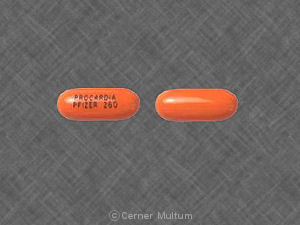Procardia
Generic name: nifedipine [ nye-FED-i-peen ]
Other brand names of nifedipine include: NIFEdipine (Eqv-Adalat CC), NIFEdipine (Eqv-Procardia XL), Procardia XL, Adalat CC, Procardia
Drug class: Calcium channel blockers
What is Procardia?
Procardia is used in adults to treat hypertension (high blood pressure) or angina (chest pain).
Procardia capsules should not be used to treat hypertension (high blood pressure).
Procardia may also be used for purposes not listed in this medication guide.
Procardia side effects
Get emergency medical help if you have signs of an allergic reaction (hives, difficult breathing, swelling in your face or throat) or a severe skin reaction (fever, sore throat, burning eyes, skin pain, red or purple skin rash with blistering and peeling).
Procardia may cause serious side effects. Call your doctor at once if you have:
-
worsening chest pain;
-
pounding heartbeats or fluttering in your chest;
-
a light-headed feeling, like you might pass out;
-
swelling in your hands or lower legs; or
-
upper stomach pain, jaundice (yellowing of the skin or eyes).
You may have more severe or more frequent episodes of angina when you first start taking Procardia or whenever your dose is changed.
Common side effects of Procardia may include:
-
swelling;
-
flushing (sudden warmth, redness, or tingly feeling);
-
headache, dizziness;
-
nausea, constipation; or
-
feeling weak or tired.
This is not a complete list of side effects and others may occur. Call your doctor for medical advice about side effects. You may report side effects to FDA at 1-800-FDA-1088.
Related/similar drugs
Warnings
You may not be able to use Procardia if your heart cannot pump blood properly.
Before taking this medicine
You should not take Procardia if you are allergic to it. You may not be able to use this medicine if your heart cannot pump blood properly.
Tell your doctor if you have or have ever had:
-
a heart attack;
-
very low blood pressure;
-
severe narrowing of the aortic valve in your heart (aortic stenosis);
-
congestive heart failure;
-
kidney disease; or
-
cirrhosis or other liver disease.
Older adults may be more sensitive to the effects of this medication.
It is not known if Procardia will harm an unborn baby. Tell your doctor if you are pregnant or plan to become pregnant.
Ask a doctor if it is safe to breastfeed while using Procardia.
How should I take Procardia?
Follow all directions on your prescription label and read all medication guides or instruction sheets. Your doctor may occasionally change your dose. Use the medicine exactly as directed.
Swallow the tablet or capsule whole and do not crush, chew, or break it.
Your dose needs may change if you switch to a different brand, strength, or form of this medicine. Avoid medication errors by using only the medicine your doctor prescribes.
Your blood pressure will need to be checked often and you may need other medical tests.
If you have high blood pressure, keep using this medicine even if you feel well. High blood pressure often has no symptoms.
If you need surgery, tell the surgeon ahead of time that you are taking Procardia. You may need to stop taking the medicine at least 36 hours before surgery.
Some tablets are made with a shell that is not absorbed or melted in the body. Part of a tablet shell may appear in your stool but this will not make the medicine less effective.
Store at room temperature away from moisture, heat, and light.
What happens if I miss a dose?
Take the medicine as soon as you can, but skip the missed dose if it is almost time for your next dose. Do not take two doses at one time.
What happens if I overdose?
Seek emergency medical attention or call the Poison Help line at 1-800-222-1222. Overdose symptoms may include irregular heartbeats, severe dizziness, or fainting.
What should I avoid while taking Procardia?
Grapefruit may interact with Procardia and cause side effects. Avoid consuming grapefruit products.
Avoid getting up too fast from a sitting or lying position, or you may feel dizzy. Get up slowly and steady yourself to prevent a fall.
What other drugs will affect Procardia?
If you have been using a beta-blocker medication (such as atenolol, carvedilol, metoprolol, propranolol, sotalol, and others), you should not stop using it suddenly. Ask your doctor about tapering your dose. Stopping a beta-blocker too quickly can cause serious heart problems that will not be prevented by Procardia.
Tell your doctor about all your other medicines, especially other heart or blood pressure medications.
Sometimes it is not safe to use certain medicines at the same time. Some drugs can affect your blood levels of other drugs you use, which may increase side effects or make the medicines less effective.
Many drugs can affect Procardia. This includes prescription and over-the-counter medicines, vitamins, and herbal products. Not all possible interactions are listed here. Tell your doctor about all other medicines you use.
More about Procardia (nifedipine)
- Check interactions
- Compare alternatives
- Reviews (7)
- Drug images
- Side effects
- Dosage information
- During pregnancy
- Generic availability
- Drug class: calcium channel blockers
- Breastfeeding
Patient resources
Other brands
Adalat CC, Nifedical XL, Nifediac CC, Afeditab CR
Professional resources
Other brands
Adalat CC, Nifedical XL, Afeditab CR
Other formulations
Related treatment guides
Further information
Remember, keep this and all other medicines out of the reach of children, never share your medicines with others, and use this medication only for the indication prescribed.
Always consult your healthcare provider to ensure the information displayed on this page applies to your personal circumstances.
Copyright 1996-2025 Cerner Multum, Inc. Version: 15.02.

